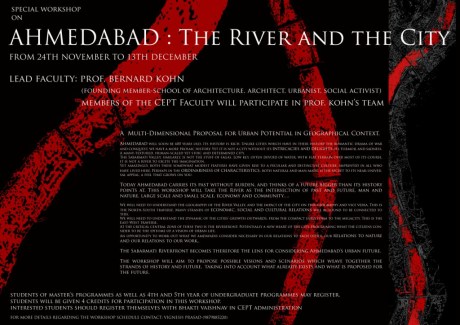About the Sabarmati Interactions Workshop
November 26, 2008
AHMEDABAD : The River and the City
A Multi-Dimensional Proposal for Urban Potential in Geographical Context.
Ahmedabad will soon be 600 years old. Its history is rich. Unlike cities which have in their history the romantic drama of war and conquest, we have a more prosaic history. Yet it is not a city without its intricacies and delights, its turmoil and sadness. A many-textured, human-scaled yet stoic and determined city.
The Sabarmati Valley, similarly, is not the stuff of sagas. Low key, often devoid of water, with flat terrain over most of its course, it is not a river to excite the imagination.
Yet amazingly, both these somewhat modest features have given rise to a peculiar and distinctive culture, imprinted in all who have lived here. Perhaps in the ordinariness of characteristics, both natural and man-made, is the secret to its near-universal appeal, a feel that grows on you.
Today Ahmedabad carries its past without burden, and thinks of a future bigger than its history points at. This workshop will take the River as the intersection of past and future, man and nature, large scale and small scale, economy and community….
We will need to understand the geography of the River Valley, and the impact of the city on this geography and vice versa. This is the North-South traverse. Many strands of economic, social and cultural relations will be found to be connected to this.
We will need to understand the dynamic of the cities’ growth outwards, from the compact early form to the megacity. This is the East-West traverse.
At the critical central zone of these two is the riverfront. Potentially a new heart of the city, proclaiming what the citizens consider to be the epitome of a vision of urban life.
An opportunity to work out what we amdavadis consider necessary in our relations to each other, our relations to nature and our relations to our work.. The Sabarmati Riverfront becomes therefore the lens for considering Ahmedabad’s urban future.
The workshop will aim to propose possible visions and scenarios which weave together the strands of history and future, taking into account what already exists and what is proposed for the future.
Faculty:
Invited Lead Faculty: Prof. Bernard Kohn.
Faculty from various programmes at CEPT will participate.
A number of speakers will be invited to address the participants and discuss proposals.
Schedule:
24th November to 13th December 2008.
Participants:
Students from CEPT programmes.
Students from other institutions in Ahmedabad.
